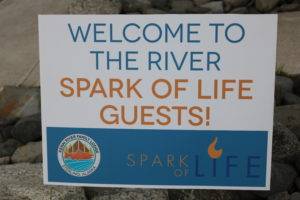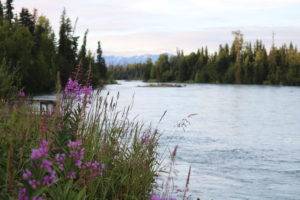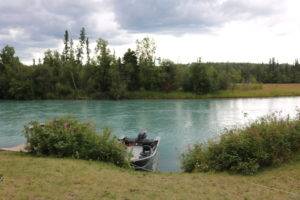A few months ago, I felt like I was at an awkward phase in my grief process. I stood at a large and gaping hole – a gap, really – between staring backward at the barren wasteland that was my life, now gone, and looking forward at the darkness of the unknown that resided on the other side. All responsibilities related to my children and my husband have been completed. My girls are where they need to be. I am where I need to be for now. Cars are sold, bills are caught up, and there was nothing left to distract me from this stark reality: I can either continue to look back at what was or I could dare to go do something real for myself. My feet were still firmly entrenched on the side of my barren wasteland. I was comfortable there. I knew what it felt like. Maybe I didn’t like it at all, but at least there were familiar feelings and expectations keeping me lost in a wilderness.
The gap between the two sides was huge, and part of the fear inside was that I’d dare to leap – and instead of landing on the side of the unknown – I’d fall further into the pit of despair. Yet again. And let’s be honest: the pit of despair can feel like home after a while. Home is where your heart is.
One day, while putzing around with the Hope for Widows blogging, I saw a request from the administrators to the blogging community. They asked us to share on our social media platforms about a grief recovery retreat called Spark of Life. This retreat was having a difficult time filling its seats on the Kenai River in Alaska. Because Alaska is such a special place to me…it was the last place my husband and I were together…I immediately went onto the website to find out what in the world was this grief recovery retreat and how much it cost. I needed something practical and deliberate to help me move along. Something hands-on and real. Talking about it and even writing about it had run its course.
Reading through the stories of the founders, it occurred to me that this might be a Christian-specific retreat. While I have no issue with a Christian retreat, I did not think it would be right for me. So, I emailed Spark of Life and immediately received a response from David  Mathews. (He likes to be called THE Dave Mathews, as I learned in person, because…well…who wouldn’t?) David referred to a FAQ on the Spark of Life website about its Christian affiliation, and after reading his email, all my concerns were answered.
Mathews. (He likes to be called THE Dave Mathews, as I learned in person, because…well…who wouldn’t?) David referred to a FAQ on the Spark of Life website about its Christian affiliation, and after reading his email, all my concerns were answered.
Spark of Life is not a Christian retreat. It is for everyone and anyone of all faith or non-faith backgrounds. The founders are Christian, but there is no proselytizing or pushing of faith. It is open to all, regardless of loss. It’s not only for spousal loss but also for children, friends, parents…all profound grief-ridden losses. Not only that, but the retreat itself – lodging, meals, materials – was free to attendees. I decided to attend with an open mind and open heart.
All I had to do was get myself to Alaska.
I am sure I will write about my entire Alaskan experience at another time because it was for more than just attending this retreat. However, for this post, I want to provide an enthusiastic endorsement for the Spark of Life Grief Recovery retreats.
Upon arrival to the lodge on the Kenai River in Sterling, Alaska, we were greeted by Debbie Mathews, one of the retreat directors, and her two granddaughters, who helped carry our luggage to our rooms and get us settled in. The intention is to make all attendees feel welcome, pampered and embraced. We had a delicious home-cooked meal and then began the process of sharing our stories and facing the daunting task of confronting our respective losses and pain.
Much like love…a loss, no matter who it is, is the most personal and individualized experience a person can face in a lifetime. My loss was devastating, and I have never known anything like it. However, everyone present, no matter the relationship with their loved one, had suffered a deep wound and found themselves needing to face it head-on and work through it in an environment that required difficult, emotional effort.
Throughout the weekend, the practical lessons of analyzing our grief included coming to terms with this basic principle: every loss is seen through the context of all the previous losses in our lives. To make this point, we participated in an exercise that has served as one of the most eye-opening and heart-wrenching emotional assignments I’ve ever been forced to contend with along this journey.
The Loss Story: I had to draw a timeline of my life. From the dawn of my consciousness to the current day, I had to list – year by year – the names or titles of my losses, the depths of my losses and how each loss made me feel at the time. The loss can be something as minor as a friend moving away when I was a child and as deep as my husband slowly dying from cancer. This was profoundly difficult to trudge through, but when I was done, I looked at it and realized just how much loss I have endured thus far in my life. “Wow. Look at all the shit I’ve been through!” The timeline is a living document, and I can add to it losses that I later remember or new losses that I accumulate in the future. It’s an incredible inventory that provides a perspective on my grief unlike anything else. This exercise also allowed me to find a running theme of the feelings I associate with my losses and how that has progressed and snowballed over the years.
The Relationship Story: I had to choose a relationship from the Loss Story in which to focus and then draw a timeline of the relationship from beginning to end. I could have chosen any relationship, but obviously, in my case, I chose my husband. On the timeline of our relationship, I wrote out all the times or things for which I had resented him, all the times or things in which I had failed or done something to hurt our marriage, and then add some highlighted remembrances of all the many good things during our time together. From this timeline, I wrote a letter to him and offered my apologies for my failures, gave forgiveness for the things in which I felt like he failed me and then thanked him for our many great memories. It was helpful to do, even though in my case, some of that had already been done before. I suppose I needed to do it again, though.
There are other exceptional pieces to this retreat that contribute toward healing, growth, encouragement and unity with the other people. I never felt like I was an outsider or did not belong among this group of strangers in a land far, far away. There was a small prayer service offered for those who wished to participate on Sunday morning; however, no one has to attend this, and it is not a part of the grief therapy of the retreat. I personally chose to attend the prayer service and considered it to be another opportunity to receive kindness and compassion or a piece of healing.
 Spark of Life retreats are held several times a year in different locations. Go to their website to see the dates, locations and if there is space available. If you do attend and appreciate what you experience, Spark of Life is fully supported by donations.
Spark of Life retreats are held several times a year in different locations. Go to their website to see the dates, locations and if there is space available. If you do attend and appreciate what you experience, Spark of Life is fully supported by donations.
Grieving and working through severe grief has been the most isolating, painful and challenging experiences of my life. I am eternally grateful to Spark of Life for helping me to heed their battle cry: Living Forward!


Hi Dori, thank you for your testimony. I am not religious so hearing that this program is not religious based gives me some ease. I’m not certain at all what to expect. I will be attending the Alaska retreat this August with a friend. We have both loss our sons. I sent an email to contact them thru their website but haven’t received a response. I am so sorry for your loss. Look forward in hearing from you.
Hi, I am not sure why they wouldn’t respond, but Debbie Mathews’ email address is debra@sparkoflife.org and I’m sure she would get back to you. I hope you enjoy Alaska and find healing and refuge there and in the program. It is a very special place. Dori